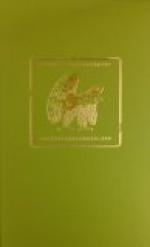The storm passed and, rousing himself, he searched his pockets vainly for a match to light his remaining cigar. Later he went through them again, hoping to find a piece of chocolate—he had carried some that morning—but this, too, was without result. He fell to cursing the packer, for appropriating the port and tinned things that were missing at lunch-time. But after that he did not talk any more and, in a little while, he stretched himself beside the unconscious figure at the foot of the crag. A second cloud lifted in a flurry of snow. Every hidden canyon sent out innumerable currents of air, and gales, meeting, lifted the powdery crust in swirls, wrapping them in a white sheet. Finally, from far off, mingling with the skirling pipes of the wind came a different, human sound. And, presently, when the call—if call it was—was repeated, the man sat up and looked dully around. But he made no effort to reply. He waited, listening stupidly, and the cry did not reach him again. Then, his glance falling to the woman, a ray of intelligence leaped in his eyes. He rose on his knees and moved her so there was room for his own bulk between her body and the rock. He had then, when he stretched himself on the snow, a windbreak.
The wind rushed screaming into the vast spaces beyond the mountain top, and returning, met the opposing forces from the canyon and instantly became a whirlwind. It cut like myriads of teeth; it struck two-edged with the swish, slash of a sword; and it lifted the advancing cloud in a mighty swirl, bellied it as though it had been a gigantic sail, and shook from its folds a deluge of hailstones followed by snow. Through it all a grotesque shape that seemed sometimes a huge, abnormal beetle and sometimes a beast, worked slowly around the crag, now crawling, now rearing upright with a futile napping of stiff wings, towards the two human figures. It was Lucky Banks, come to rescue them.
A heavier blast threw him on his face, but he rose to his knees and, creeping close, squared his shoulders to protect the slighter body. At the same time the significance of the position of Morganstein’s unconscious bulk struck him. “You rat!” he cried with smothered fury. “You damn rat!”
Then he caught up a handful of snow with which he began to rub the woman’s face. Afterwards he removed her gloves to manipulate her cold hands. He worked swiftly, with the deftness of practice, but the results were slow, and presently he took the rug from the pack he carried and covered her while he felt in Frederic’s pockets for the flask he had neglected to return. “Likely there wasn’t a drop left when she came to need it, you brute. And I’d like to leave you here to take your chances. You can thank your luck I’ve got to use you.”
Banks keyed his voice high, between breaths, to out-scale the wind, but he did not wait for a reply. Before he finished speaking, he had opened his big, keen-bladed clasp-knife and commenced to cut broad strips from the rug. He passed some of these, not without effort, under Morganstein’s body, trussing the arms. Then, wrapping the smaller figure snugly in the blanket, he lifted it on to the human toboggan he had made and bound it securely. Finally he converted the shoulder-straps of his pack into a sort of steering gear, to which he fastened his life-line.




